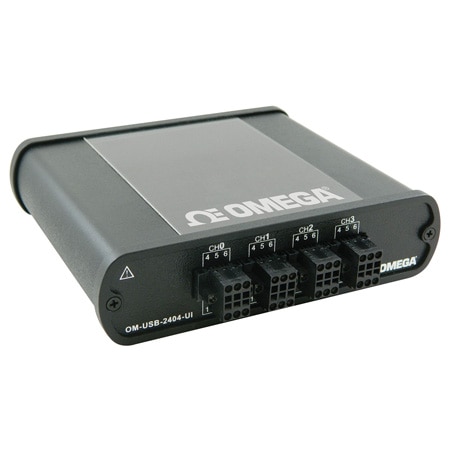The new OM-USB-2404-UI provides four channels of 24-bit universal analog input with integrated signal conditioning. The device can be used to measure a variety of sensor types such as RTDs, thermocouples, load cells, and other powered sensors. The four channels are individually configurable, so a different measurement type can be performed on each channel. All channels are measured simultaneously at up to 100 S/s per channel.
The OM-USB-2404-UI can perform the following measurements: • Voltage • Current • Thermocouple • RTD (3- and 4-wire) • Resistance (2- and 4-wire) • Bridge-based sensors (quarter-, half-, and full-bridge) Measurement ranges vary for each type of measurement (see PDF for complete specifications).
The device features a built-in current and voltage excitation. The excitation circuit is protected from overcurrent and overvoltage fault conditions. Each channel also has a built-in thermistor for cold-junction compensation (CJC) calculations when measuring thermocouples. An analog pre-filter removes noise that may be present in the signals prior to conversion.
With 250 Vac channel-to-channel and channel-to-ground isolation, the OM-USB-2404-UI protects the individual channels and connected computer and ensures a reliable data stream. Each channel has a detachable six-position screw terminal block for field wiring connections.
The OM-USB-2404-UI ships with a 2 m (6') USB cable and is powered by the 5V USB supply from your computer. No external power is required.
The OM-USB-2404-UI is a USB 2.0 high-speed device that is supported under popular Microsoft Windows® operating systems. The OM-USB-2404-UI is fully compatible with both USB 1.1 and USB 2.0 ports.
Software The OM-USB-2404-UI module ships with an impressive array of software, including the new TracerDAQ®, a full-featured, out-of-the-box data logging, viewing, and analysis application. Driver support and detailed example programs are included for Universal Library programming libraries for Microsoft® Visual Studio® programming languages, and other languages, including DASYLab®, and ULx for NI LabVIEW® (comprehensive library of Vls and example programs compatible with 32-bit and 64-bit LabVIEW v8.5 through 2013) and InstaCal™ installation, calibration and test utility-powerful solutions for programmers and nonprogrammers alike. These modules operate under Microsoft Windows® XP (32-bit only) and VISTA/7/8 (32-bit and 64-bit) operating systems.
The OM-USB-2404-UI data acquisition module is supplied with TracerDAQ software which is a collection of four virtual instrument applications used to graphically display and store input data and generate output signals:
• Strip Chart—Log and graph values acquired from analog inputs, digital inputs, temperature inputs and counter inputs
• Oscilloscope—Display values acquired from analog inputs
• Function Generator—Generate waveforms for analog outputs
• Rate Generator—Generate waveforms for counter outputs
TracerDAQ PRO is an enhanced version of TracerDAQ. A comparison of some of the features included in TracerDAQ vs TracerDAQ PRO is shown on the PDF.
SPECIFICATIONS
ANALOG INPUT
Number of Channels: 4
A/D Converter Resolution: 24-bit
A/D Converter Type: Delta-Sigma with analog pre-filtering
Sampling Mode: Simultaneous
TEDS Sensor Type Supported: IEEE 1451.4 TEDS Class II (interface)
Input Mode: Voltage, current, resistance (2- and 4-wire), RTD (3- and 4-wire), thermocouple, quarter-bridge, half-bridge, full-bridge
Conversion Time (No channels in TC mode)
High Speed: 10 ms for all channels
Best 60 Hz Rejection: 110 ms for all channels
Best 50 Hz Rejection: 130 ms for all channels
High Resolution: 500 ms for all channels
Conversion Time (One or More Channels in TC Mode)
High Speed: 20 ms for all channels
Best 60 Hz Rejection: 120 ms for all channels
Best 50 Hz Rejection: 140 ms for all channels
High Resolution: 510 ms for all channels
Overvoltage Protection
Terminals 1 and 2: ±30V
Terminals 3 Through 6, Across any Combination: ±60V
Input Impedance
Voltage Mode (±60V, ±15V, ±4V): 1 M?
Current Mode: <40 ?
All Other Modes: >1G?
Input Bias Current: <1nA
Integral Non-Linearity (INL): ±15 ppm
Common Mode Rejection Ratio (CMRR): >100 dB
Normal Mode Rejection Ratio (NMRR)
Best 60 Hz Rejection: 90 dB at 60 Hz
Best 50 Hz Rejection: 80 dB at 50 Hz
High Resolution: 65 dB at 50 Hz and 60 Hz
GENERAL
Operating Temperature Range: 0 to 60ºC (32 to 140ºF), 10 to 90% RH non-condensing
Storage Temperature Range: -40 to 85ºC (-40 to 185ºF), 5 to 95% RH non-condensing
Communications: USB 2.0 Hi-Speed mode (480 Mbps) is recommended; otherwise USB 1.1 full-speed mode (12 Mbps)
Current Consumption from USB: 500 mA, maximum
Channel-to-Earth Ground Isolation
Continuous: 250 Vrms (measurement category II for measurements performed on circuits directly
connected to the electrical distribution system)
Withstand: 2300 Vrms (verified by a 5 second dielectric withstand test)
Channel-to-Channel Isolation
Continuous: 250 Vrms (measurement category II for measurements performed on circuits directly
connected to the electrical distribution system)
Withstand: 1390 Vrms (verified by a 5 second dielectric withstand test)
Signal I/O Connector: 6-position screw terminals
Screw terminal Wiring: 18 to 28 AWG copper conductor wire with 7 mm (0.28") of insulation stripped from the end
Maximum Altitude: 2000 m (6562')
Dimensions: 134 L x 143 W x 39 mm H (5.27 x 5.64 x 1.54")
Weight: 567 g (1.25 lb)
